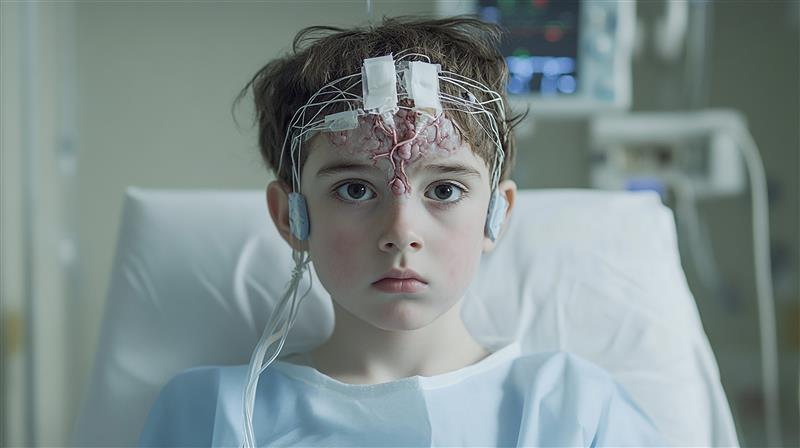
Understanding Pediatric Epilepsy
Pediatric epilepsy is a neurological disorder that causes children to experience repeated seizures. It can affect kids at any age—from newborns to teenagers—and is more common in children compared to adults. For parents in Hanamkonda and Warangal, recognizing the symptoms early is crucial because epilepsy in children may look very different from seizures in adults.
The causes of epilepsy in children can range from brain injuries at birth, genetic factors, infections, metabolic disorders, and structural abnormalities in the brain. Some common conditions linked with pediatric epilepsy include hypoxic ischemic encephalopathy (HIE), low blood sugar, genetic disorders like Dravet syndrome, and brain malformations such as focal cortical dysplasia or lissencephaly.
Since seizures in children can occur both during sleep and wakefulness, they are often misdiagnosed or overlooked. Sometimes a single child may experience multiple types of seizures, which makes it challenging for parents to identify the condition without medical guidance.
Signs and Symptoms of Seizures in Children
If you are a parent in Warangal or Hanamkonda and notice any unusual movements or behaviors in your child, it is important not to ignore them. Seizures may not always look like the dramatic convulsions shown on TV. They can present as:
- Sudden staring spells or lapses in attention
- Repetitive movements such as lip-smacking or hand jerking
- Loss of consciousness or sudden falls
- Stiffness in muscles or unusual postures
- Confusion or disorientation after an episode
Early recognition of these symptoms allows you to consult a pediatric neurologist in Hanamkonda or Warangal and get timely treatment.
How Pediatric Epilepsy is Diagnosed
Diagnosing epilepsy in children involves a thorough medical history, clinical examination, and specialized tests. At advanced epilepsy centers in Hanamkonda and Warangal, doctors use:
- EEG (Electroencephalogram): Measures electrical activity in the brain to detect seizure patterns.
- MRI Scan of the Brain: Identifies structural abnormalities, birth injuries, or brain malformations.
- Biochemical Tests: Check for metabolic or genetic causes that may trigger seizures.
An accurate diagnosis is essential because treatment plans vary depending on the type of epilepsy, the child’s age, and overall health condition.
Treatment Options for Pediatric Epilepsy
The good news is that pediatric epilepsy is controllable with proper treatment. The first line of management is usually anti-seizure medications prescribed by a pediatric neurologist. These medications are carefully chosen based on:
- Age of the child
- Type and frequency of seizures
- Presence of epilepsy syndromes
- Side effects and long-term tolerance
Parents must remember that epilepsy medicine should never be stopped abruptly. Doing so can trigger more severe seizures. Regular follow-up with a pediatric neurologist in Warangal or Hanamkonda helps monitor the child’s progress and adjust medications as needed.
In some cases where medicines are not effective, advanced options such as dietary therapies (like the ketogenic diet), epilepsy surgery, or newer medical devices may be considered.
Life with Pediatric Epilepsy: What Parents Should Know
Many children with epilepsy eventually outgrow the condition as they reach adolescence or adulthood. For families in Hanamkonda and Warangal, awareness and support play an important role in improving a child’s quality of life.
Here are a few essential tips for parents:
- Medication adherence: Always give medicines on time as prescribed.
- Regular checkups: Consult your doctor for follow-ups to assess side effects and effectiveness.
- School support: Inform teachers about your child’s condition so they can handle an episode if it occurs at school.
- Healthy lifestyle: Ensure proper sleep, balanced diet, and stress management, as these can reduce seizure frequency.
- Emergency care: Learn seizure first-aid to protect your child during an episode.
Pediatric Epilepsy Specialists in Hanamkonda & Warangal
If you are searching for the best pediatric epilepsy treatment in Hanamkonda or Warangal, consulting an experienced pediatric neurologist is the first step. With modern diagnostic tools, advanced medication options, and supportive care, most children can lead normal and fulfilling lives.
Parents in Warangal and Hanamkonda can access exclusive pediatric epilepsy services that focus on both medical treatment and emotional well-being. Clinics here provide tailored care for each child, helping families manage the condition effectively.
Why Choose Specialized Care for Pediatric Epilepsy in Hanamkonda & Warangal?
Choosing a dedicated pediatric neurology and epilepsy center ensures that your child receives personalized treatment. Unlike general hospitals, these centers are equipped with:
- Advanced EEG and MRI facilities
- Child-friendly treatment environments
- Experienced epilepsy specialists
- Long-term monitoring programs
- Family counseling and education sessions
Such comprehensive care helps children with epilepsy achieve better seizure control, academic success, and improved quality of life.
Conclusion
Pediatric epilepsy may seem overwhelming at first, but with the right diagnosis, treatment, and family support, children can live healthy and independent lives. For parents in Hanamkonda and Warangal, early consultation with a pediatric neurologist makes all the difference. Whether you are searching for the best pediatric epilepsy doctor in Warangal, or want guidance on managing your child’s seizures in Hanamkonda, timely medical attention ensures your child’s future remains bright and hopeful.